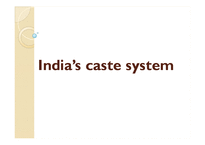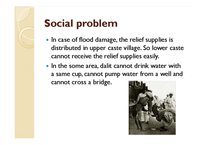Ⅰ. What is the caste system?
Ⅱ. Social problem
Ⅲ. Special treatments to Scheduled Caste and Scheduled Tribe
Ⅳ. Successful people from Dalit
Ⅴ. Conflict due to reverse discrimination
Caste is a unique status system of India society. Traditionally, India is composed of Brahman , Kshatriya, Vaisya, Sudra and scheduled caste (untouchables) who can't belong to four castes.
Untouchables are called scheduled caste, Harijan, and Dalit.
They prefer to use 'Dalit' that means persecuted person instead of untouchables to emphasize that they were persecuted by higher caste people.
Caste shows rank of highs and lows, that is, novel person and humble person. Higher caste people consider that they get spoiled when they come near lower castes.
Each caste passed on job to their descendants and intermarriage was prohibited.
1. intermarriage
Traditionally, they have an arranged marriage. Parents decide their children's spouse in the same castes. If they cannot find the suitable spouse, they advertise in the newspaper the terms of marriage such as caste, economic status, birthplace, family, income, job, education level, residential district etc.
These days some people marry for love. But still, many people think that they have to obey the rules of marriage. The one who intermarried run away from the village, Some are even expelled, or physically attacked by their own family members.
Annually, about 900 people killed by their family so-called "honor killing".
It is not disappear in the big city like Delhi as well as countryside.
For example, a father-in-law throw the daughter-in-law in the river. Because the daughter-in-law is different caste so they don't admit her. After they know that the woman is pregnant, they throw the woman in the river. Fortunately, the woman was found by fishermen.
2. the imbalance of education
In india, there are government school(공립학교) and public school(사립학교).
Upper class students are educated in public school. And they wear school uniforms, and take lessons in English.
But most students are educated in government school and their education facilities are not good.
Some teachers in government school think that they don't need to teach for student. Because the student's job is determined by succession. Even 25% of elementary school teacher don't show up.
Two classes get together in the same place and students are crouching in the hallway to study by themselves.
http://news.naver.com/main/read.nhn?mode=LSD&mid=sec&sid1=117&oid=078&aid=0000035038
http://news.naver.com/main/read.nhn?mode=LSD&mid=sec&sid1=104&oid=001&aid=0001741092
http://news.naver.com/main/read.nhn?mode=LSD&mid=sec&sid1=117&oid=078&aid=0000033035
http://shindonga.donga.com/docs/magazine/shin/2012/03/20/201203200500022/201203200500022_1.html
http://kin.naver.com/qna/detail.nhn?d1id=6&dirId=60904&docId=76925710&qb=7Lm07Iqk7Yq47KCc64+EIOusuOygnA==&enc=utf8§ion=kin&rank=3&search_sort=0&spq=0&pid=gIVr2F5Y7thssvTPu40ssc--001591&sid=T6so8W0oq08AABTVA8E
http://newsmaker.khan.co.kr/khnm.html?mode=view&code=117&artid=18034&pt=nv
논문 - 백촤흠
http://100.naver.com/100.nhn?docid=150305
http://m.kin.naver.com/mobile/qna/detail.nhn?d1id=11&dirId=111002&docId=118700015&qb=66eI7JW87JmA7Yuw&enc=utf8§ion=kin&rank=1&search_sort=0&spq=0























 분야
분야


